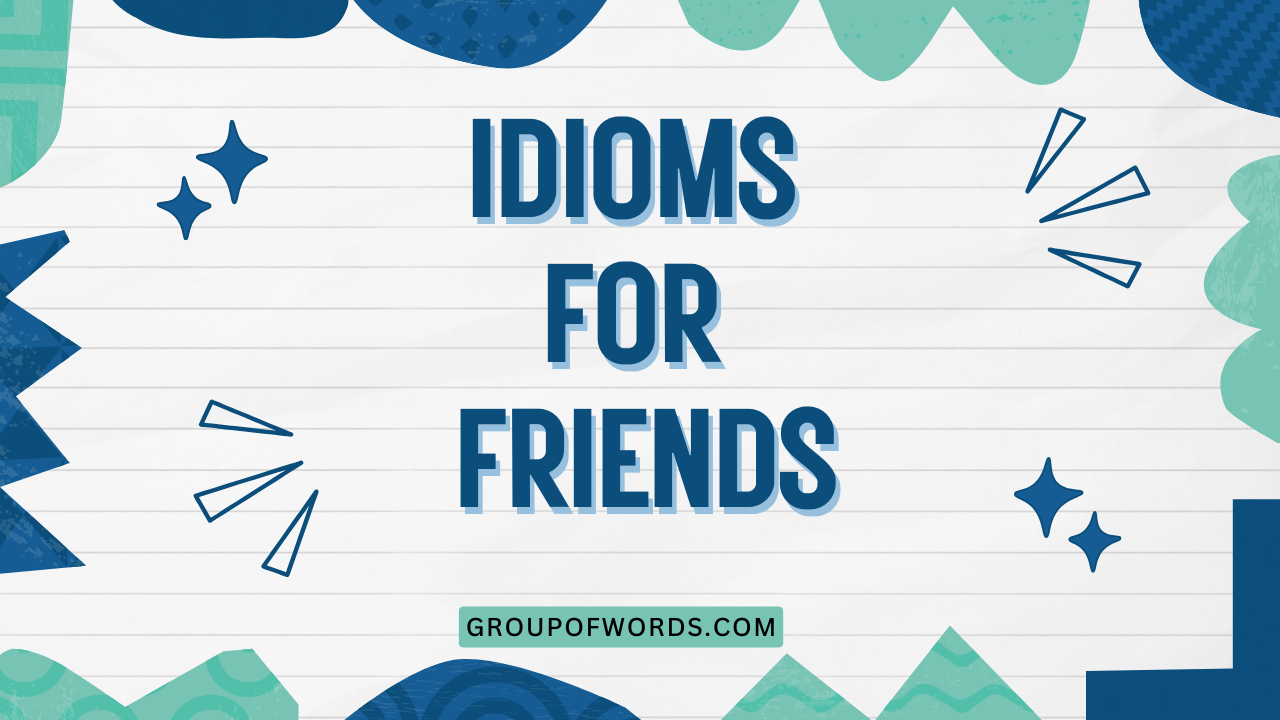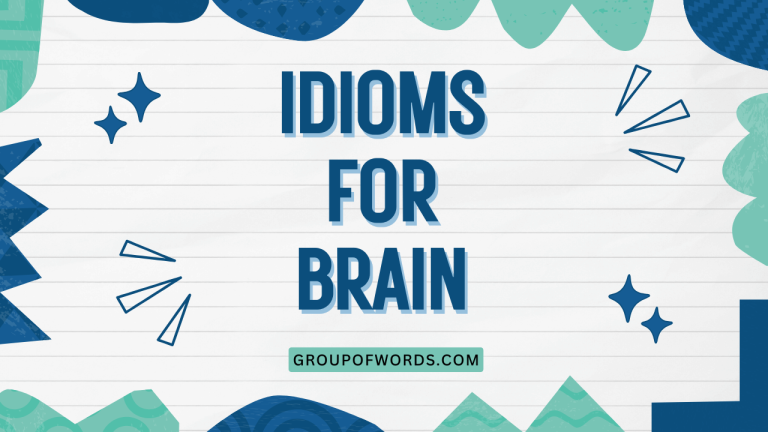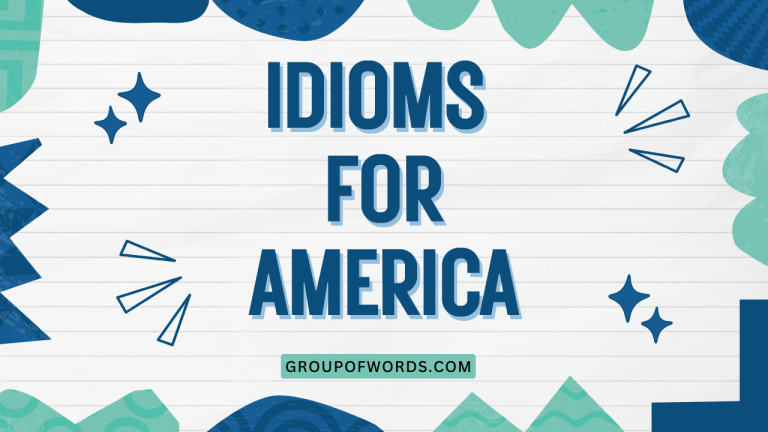Idioms for Friends: Expanding Your English Vocabulary
Understanding idioms is crucial for mastering English, especially in social contexts. Idioms add color and nuance to everyday conversations, allowing you to express yourself more vividly and understand native speakers more effectively.
This article focuses specifically on idioms related to friendships, helping you enrich your vocabulary and communicate more naturally about your relationships. Whether you’re an English language learner or simply looking to improve your communication skills, this guide will provide you with the definitions, examples, and practice you need to confidently use idioms about friends.
This comprehensive guide is designed for English learners of all levels, from beginner to advanced. By the end of this article, you’ll be able to recognize, understand, and use a variety of idioms related to friendship in both spoken and written English.
We’ll cover everything from basic definitions to advanced usage tips, ensuring that you have a solid foundation in this important area of English vocabulary.
Table of Contents
- Introduction
- Definition of Idioms for Friends
- Structural Breakdown
- Types and Categories of Idioms for Friends
- Examples of Idioms for Friends
- Usage Rules
- Common Mistakes
- Practice Exercises
- Advanced Topics
- FAQ
- Conclusion
Definition of Idioms for Friends
An idiom is a phrase or expression whose meaning cannot be understood from the literal meanings of the individual words that comprise it. Instead, it has a figurative meaning that is known through common usage.
Idioms related to friends are expressions that describe different aspects of friendship, such as support, loyalty, conflict, closeness, and shared experiences.
These idioms are often used to add color and depth to conversations about relationships. They can also be used to express feelings and emotions in a more nuanced way than literal language allows.
Understanding idioms is an essential part of mastering English, as they are frequently used in both spoken and written communication. Mastering idioms for friends allows you to discuss the complexities of relationships with greater ease and accuracy.
Classification: Idioms can be classified in several ways, including by their function (e.g., describing emotions, actions, or situations) and by their grammatical structure (e.g., phrasal verbs, prepositional phrases, or clauses). Idioms related to friends typically function to describe the nature, quality, or dynamics of a friendship.
Function: The primary function of idioms for friends is to convey meaning beyond the literal. They often express emotions, experiences, or qualities associated with friendship in a more vivid and memorable way. For example, saying someone is “a shoulder to cry on” is a more evocative way of saying they are supportive.
Contexts: Idioms for friends are used in a variety of contexts, including casual conversations, formal writing, and creative works such as literature and film. They are particularly common in situations where people are discussing their relationships or reflecting on their experiences with friends.
Structural Breakdown
The structure of idioms can vary widely. Some idioms are simple phrases, while others are more complex sentences.
Understanding the structure of idioms can help you to recognize and interpret them more easily.
Phrasal Verbs: Many idioms are based on phrasal verbs, which are verbs combined with a preposition or adverb. For example, “fall out” (to have a disagreement) is a phrasal verb that is commonly used in idioms about conflict between friends. The meaning of the phrasal verb is different from the meaning of the individual words.
Prepositional Phrases: Some idioms are prepositional phrases, which are phrases that begin with a preposition. For example, “thick as thieves” (very close friends) is a prepositional phrase that describes a close relationship.
Clauses: Some idioms are clauses, which are groups of words that contain a subject and a verb. For example, “birds of a feather flock together” (people who are similar tend to associate with each other) is a clause that expresses a general truth about friendships.
Figurative Language: Idioms often use figurative language, such as metaphors and similes, to create vivid images and convey meaning. For example, “like two peas in a pod” (very similar) uses a simile to compare friends to peas in a pod.
Types and Categories of Idioms for Friends
Idioms for friends can be categorized based on the aspect of friendship they describe. Here are some common categories:
Idioms about Support and Loyalty
These idioms describe the ways in which friends support and are loyal to each other. They often emphasize the reliability and trustworthiness of true friends.
Idioms about Closeness and Intimacy
These idioms describe the level of closeness and intimacy between friends. They often emphasize the emotional connection and shared experiences that bind friends together.
Idioms about Conflict and Distance
These idioms describe situations where friends have disagreements or become distant from each other. They often emphasize the challenges and difficulties that can arise in friendships.
Idioms about Shared History and Experiences
These idioms describe the shared history and experiences that friends have together. They often emphasize the memories and bonds that are created over time.
Idioms Describing Friendship Qualities
These idioms describe the qualities that make a good friend. These can include trustworthiness, reliability, humor, and understanding.
Examples of Idioms for Friends
The following sections provide examples of idioms for friends, organized by category.
Idioms about Support and Loyalty
These idioms describe the ways in which friends support and are loyal to each other. They often emphasize the reliability and trustworthiness of true friends.
Here’s a table containing examples of idioms about support and loyalty, along with their meanings and example sentences:
| Idiom | Meaning | Example Sentence |
|---|---|---|
| A shoulder to cry on | Someone who is willing to listen to your problems and offer comfort. | When Sarah lost her job, her best friend was a shoulder to cry on. |
| Through thick and thin | Through good times and bad times. | We’ve been friends through thick and thin for over 20 years. |
| To have someone’s back | To support and protect someone. | You can always count on me to have your back, no matter what. |
| To be there for someone | To be available and supportive when someone needs you. | I know I can always count on her to be there for me. |
| To stick up for someone | To defend someone who is being criticized or attacked. | He always sticks up for his friends, even when they’re wrong. |
| To go to bat for someone | To support or defend someone, especially when they are in trouble. | My lawyer went to bat for me and got the charges dropped. |
| To stand by someone | To support someone, especially during a difficult time. | Even when everyone else doubted him, she stood by him. |
| To be a true friend | Someone who is loyal, supportive, and always there for you. | She proved to be a true friend when she helped me move. |
| To be a rock | Someone who is strong and reliable, especially during a crisis. | During the crisis, he was a rock for his family. |
| To be in someone’s corner | To support someone. | I’m in your corner, whatever you decide to do. |
| Ride or die | Extremely loyal and supportive, even in the face of danger or difficulty. | She’s my ride or die; I know she’ll always be there for me. |
| A friend in need is a friend indeed | A true friend is someone who helps you when you are in trouble. | He helped me move at the last minute, proving that a friend in need is a friend indeed. |
| To go the extra mile | To do more than what is expected of you. | She always goes the extra mile for her friends. |
| To have someone’s back covered | To ensure someone is protected and supported. | I’ll have your back covered if you need anything during the presentation. |
| To be a pillar of strength | To provide unwavering support and stability. | After losing her parents, her best friend was a pillar of strength for her. |
| To go out on a limb for someone | To take a risk to support someone. | He went out on a limb for his friend by vouching for him at the bank. |
| To be a safe harbor | To provide a place of safety and comfort. | Her home was always a safe harbor for her friends when they needed to escape. |
| To be a constant | To be reliable and unchanging in one’s support. | Through all the ups and downs, she was a constant in his life. |
| To be a shield | To protect someone from harm or criticism. | He acted as a shield for his younger brother, protecting him from bullies. |
| To be a lifeline | To provide essential support in a difficult situation. | Her friendship was a lifeline when he was going through a divorce. |
| To be a guardian angel | To watch over and protect someone. | She felt like her best friend was her guardian angel, always looking out for her. |
| To bail someone out | To help someone out of a difficult situation, often involving money. | I had to bail my friend out when he got into debt. |
| To carry someone’s burden | To help someone with their problems or responsibilities. | She offered to carry some of his burden by helping him with his tasks. |
| To go to the mat for someone | To fight fiercely for someone’s cause. | He went to the mat for his friend, arguing his case before the committee. |
Idioms about Closeness and Intimacy
These idioms describe the level of closeness and intimacy between friends. They often emphasize the emotional connection and shared experiences that bind friends together.
Here’s a table containing examples of idioms about closeness and intimacy, along with their meanings and example sentences:
| Idiom | Meaning | Example Sentence |
|---|---|---|
| Like two peas in a pod | Very similar and close. | They are like two peas in a pod; they do everything together. |
| Thick as thieves | Very close and secretive. | Those two are thick as thieves; I bet they know all each other’s secrets. |
| Joined at the hip | Inseparable, always together. | Since they started dating, they’ve been joined at the hip. |
| Bosom buddies | Very close friends. | They’ve been bosom buddies since kindergarten. |
| Kindred spirits | People who share the same interests and feelings. | They quickly realized they were kindred spirits and became fast friends. |
| To be inseparable | Unable to be parted or separated. | They were inseparable during their college years. |
| To have a bond | To have a close connection. | They have a strong bond that nothing can break. |
| To click with someone | To immediately like and get along with someone. | We clicked with each other the moment we met. |
| To hit it off | To quickly become good friends. | They hit it off at the party and have been friends ever since. |
| To be on the same wavelength | To understand each other easily. | We’re always on the same wavelength; we just get each other. |
| To share a special connection | To have a unique and meaningful relationship. | They share a special connection that goes beyond friendship. |
| To be soulmates | People who are deeply connected and understand each other perfectly. | Some people believe that best friends can be soulmates. |
| To have each other’s back | To support and protect each other | They always have each other’s back, no matter what. |
| To finish each other’s sentences | To know each other so well that you can anticipate what the other person is going to say. | They’ve been friends for so long that they can finish each other’s sentences. |
| To know someone inside and out | To know someone very well. | After all these years, I know her inside and out. |
| To have a deep understanding | To understand someone on a profound level. | They have a deep understanding of each other’s feelings and thoughts. |
| To share a history | To have a shared past and experiences. | They share a history that makes their friendship even stronger. |
| Two peas in a pod | Very similar and always together. | Those two are like two peas in a pod. They do everything together. |
| To be as close as two coats of paint | To be very close and inseparable. | They’re as close as two coats of paint; you never see one without the other. |
| To be in each other’s pockets | To be very close and spend a lot of time together. | They’re in each other’s pockets all the time; it’s hard to catch one without the other. |
| To be like brother and sister | To have a very close and familial relationship. | They’re like brother and sister; they argue sometimes, but they always have each other’s back. |
| To be joined at the hip | To be inseparable and always together. | Since they started working together, they’ve been joined at the hip. |
| To be bosom buddies | To be very close and intimate friends. | They’ve been bosom buddies since their college days. |
| To be kindred spirits | To have a natural connection due to shared interests and values. | They realized they were kindred spirits and became fast friends. |
Idioms about Conflict and Distance
These idioms describe situations where friends have disagreements or become distant from each other. They often emphasize the challenges and difficulties that can arise in friendships.
Here’s a table containing examples of idioms about conflict and distance, along with their meanings and example sentences:
| Idiom | Meaning | Example Sentence |
|---|---|---|
| To fall out with someone | To have a disagreement and stop being friends. | They fell out with each other over a misunderstanding. |
| To drift apart | To gradually become less close to someone. | After college, they started to drift apart. |
| To have a falling out | To have a serious argument that damages a friendship. | They had a falling out over a business deal. |
| To rub someone the wrong way | To annoy or irritate someone. | His constant complaining started to rub me the wrong way. |
| To get on someone’s nerves | To irritate or annoy someone. | Her constant talking gets on my nerves. |
| To give someone the cold shoulder | To ignore someone or treat them in an unfriendly way. | She gave him the cold shoulder after their argument. |
| To be at odds with someone | To disagree or be in conflict with someone. | They’ve been at odds with each other for years. |
| To have words with someone | To have an argument with someone. | They had words with each other after the game. |
| To bury the hatchet | To make peace after a disagreement. | After years of feuding, they finally decided to bury the hatchet. |
| To clear the air | To resolve misunderstandings and improve a strained relationship. | They needed to clear the air after the argument. |
| To distance oneself from someone | To create emotional or physical space between oneself and another person. | After the scandal, he distanced himself from his former friends. |
| To go their separate ways | To end a relationship and pursue different paths. | After graduation, they went their separate ways. |
| To cut ties with someone | To end a relationship completely. | She decided to cut ties with her toxic friend. |
| To burn bridges | To do something that damages a relationship beyond repair. | He burned bridges when he betrayed his friend’s trust. |
| To drive a wedge between people | To cause a conflict or disagreement that separates people. | Their jealousy drove a wedge between the two friends. |
| To be on the outs | To be in a state of disagreement or estrangement. | They’ve been on the outs ever since their argument at the party. |
| To have a bone to pick with someone | To have a grievance to discuss with someone. | I have a bone to pick with you about what you said yesterday. |
| To be at loggerheads | To be in strong disagreement or conflict. | They were at loggerheads over the direction of the project. |
| To lock horns | To engage in a conflict or argument. | The politicians often lock horns on important issues. |
| To be estranged | To no longer be on friendly terms. | They’ve been estranged since their falling out last year. |
| To be out of touch | To no longer communicate regularly. | We’ve been out of touch since I moved to another city. |
| To let someone down | To disappoint someone by failing to meet their expectations. | I felt like I let my friend down when I couldn’t help her move. |
| To take something the wrong way | To misunderstand something and be offended by it. | He took my comment the wrong way and got upset. |
| To have a misunderstanding | To have a disagreement due to a lack of clear communication. | They had a misunderstanding that led to a temporary rift. |
Idioms about Shared History and Experiences
These idioms describe the shared history and experiences that friends have together. They often emphasize the memories and bonds that are created over time.
Here’s a table containing examples of idioms about shared history and experiences, along with their meanings and example sentences:
| Idiom | Meaning | Example Sentence |
|---|---|---|
| To go way back | To have known someone for a long time. | We go way back; we’ve been friends since childhood. |
| Old friends | Friends who have known each other for many years. | It was great to catch up with some old friends at the reunion. |
| To have history together | To have shared many experiences together over time. | They have history together, which makes their friendship strong. |
| To reminisce about old times | To talk about and remember past experiences. | We spent the evening reminiscing about old times. |
| To relive memories | To experience past events again in one’s mind. | Looking at old photos helped us relive memories of our childhood. |
| To share common ground | To have similar interests or experiences. | They share common ground, which makes it easy for them to connect. |
| To have seen each other through a lot | To have supported each other through many difficult experiences. | We’ve seen each other through a lot over the years. |
| To build memories together | To create shared experiences that become cherished memories. | We’ve built so many memories together over the years. |
| To have a shared past | To have a history of shared experiences. | Their shared past is a strong foundation for their friendship. |
| To have a bond that can’t be broken | To have a very strong and unbreakable connection. | They have a bond that can’t be broken after all they’ve been through. |
| To have been through the wringer together | To have experienced many difficult situations together. | They’ve been through the wringer together, which has made them closer. |
| To have weathered the storm together | To have survived a difficult period together. | They weathered the storm together and emerged stronger. |
| To have shared laughter and tears | To have experienced both joyful and sad moments together. | They’ve shared laughter and tears throughout their friendship. |
| To have a treasure trove of memories | To have a large collection of cherished memories. | They have a treasure trove of memories to look back on. |
| To have a history that binds them | To have a shared past that strengthens their connection. | Their history binds them together, making their friendship unique. |
| To have walked the same path | To have had similar experiences and challenges. | They’ve walked the same path, which gives them a unique understanding of each other. |
| To have shared adventures | To have experienced exciting and memorable events together. | They’ve shared many adventures, creating lasting memories. |
| To have a tapestry of experiences | To have a rich and varied collection of shared experiences. | Their friendship is a tapestry of shared experiences. |
| To have grown up together | To have known each other since childhood. | They grew up together and share a special bond. |
| To have a long and winding road together | To have had a friendship with many ups and downs. | They’ve had a long and winding road together, but their friendship has endured. |
| To be like an old shoe | To be comfortable and familiar with someone. | After all these years, they’re like an old shoe to each other. |
| To have seen the best and worst of each other | To have witnessed each other’s strengths and weaknesses. | They’ve seen the best and worst of each other and still remain friends. |
| To be joined at the hip since [time] | To have been inseparable since a particular time. | They’ve been joined at the hip since their college days. |
| To have a rolodex of memories | To have a vast collection of memories to draw from. | They have a rolodex of memories from their years together. |
Idioms Describing Friendship Qualities
These idioms describe the qualities that make a good friend. These can include trustworthiness, reliability, humor, and understanding.
Here’s a table containing examples of idioms describing friendship qualities, along with their meanings and example sentences:
| Idiom | Meaning | Example Sentence |
|---|---|---|
| A true friend | Someone who is loyal, supportive, and always there for you. | She has proven to be a true friend over the years. |
| A fair-weather friend | Someone who is only a friend when things are going well. | He turned out to be a fair-weather friend when I needed help. |
| A friend indeed | Someone who helps you when you are in trouble. | He helped me move at the last minute, proving he was a friend indeed. |
| A confidant | Someone you can trust with your secrets. | She’s my confidant; I tell her everything. |
| A shoulder to cry on | Someone who is willing to listen to your problems and offer comfort. | When I’m feeling down, she’s always a shoulder to cry on. |
| A partner in crime | Someone who you enjoy doing mischievous things with. | They’re partners in crime and always up to something fun. |
| A rock | Someone who is strong and reliable, especially during a crisis. | During the crisis, he was a rock for his family. |
| A breath of fresh air | Someone who brings new energy and positivity to a situation. | Her optimism is a breath of fresh air. |
| A ray of sunshine | Someone who brings joy and happiness to others. | Her smile is like a ray of sunshine. |
| A voice of reason | Someone who offers sensible and logical advice. | He’s always the voice of reason in our group. |
| A beacon of hope | Someone who inspires hope and optimism. | She’s a beacon of hope for the community. |
| A guiding light | Someone who provides guidance and direction. | He’s been a guiding light throughout my career. |
| A constant | Someone who is reliable and unchanging in one’s support. | Through all the ups and downs, she’s been a constant in my life. |
| A steady hand | Someone who provides stability and reassurance. | He’s a steady hand in times of uncertainty. |
| A source of inspiration | Someone who motivates and encourages you to achieve your goals. | She’s a source of inspiration to me. |
| A kindred spirit | Someone who shares the same interests and feelings. | They’re kindred spirits and understand each other perfectly. |
| A soulmate | Someone who is deeply connected and understands you perfectly. | Some people believe that best friends can be soulmate. |
| A brother/sister from another mother | Someone who is as close as a sibling, even though they’re not related. | He’s like a brother from another mother to me. |
| The salt of the earth | Someone who is honest, reliable, and good-natured. | He’s the salt of the earth; you can always count on him. |
| The life of the party | Someone who is fun, energetic, and makes social gatherings lively. | She’s always the life of the party. |
| The glue that holds the group together | Someone who keeps a group of friends connected and harmonious. | She’s the glue that holds our group together. |
| The heart and soul | Someone who embodies the best qualities of a friendship or group. | He’s the heart and soul of our team. |
| The backbone | Someone who provides strength and support. | She’s the backbone of our organization. |
| A friend in need | Someone who helps you when you are in trouble. | A friend in need is a friend indeed. |
Usage Rules
Using idioms correctly requires understanding their specific meanings and contexts. Here are some rules to keep in mind:
- Context is Key: Always consider the context in which you are using an idiom. The meaning of an idiom can change depending on the situation.
- Know Your Audience: Be aware of your audience’s familiarity with idioms. Avoid using obscure idioms that your audience may not understand.
- Avoid Overuse: Using too many idioms can make your language sound unnatural or forced. Use them sparingly and appropriately.
- Grammatical Structure: Pay attention to the grammatical structure of the idiom. Do not change the words or the order of the words, as this can alter the meaning or make the idiom nonsensical.
- Appropriateness: Consider the formality of the situation. Some idioms are more appropriate for casual conversations, while others are suitable for more formal settings.
Common Mistakes
Here are some common mistakes that learners make when using idioms about friends:
| Incorrect | Correct | Explanation |
|---|---|---|
| “They are like two apples in a basket.” | “They are like two peas in a pod.” | Using the wrong words in the idiom. |
| “We felt out with each other.” | “We fell out with each other.” | Using the wrong form of the verb. |
| “He gave me a cold arm.” | “He gave me the cold shoulder.” | Misremembering the idiom. |
| “She is a friend in need is a friend indeed.” | “A friend in need is a friend indeed.” | Adding unnecessary words. |
| “They are thick as bricks.” | “They are thick as thieves.” | Using the incorrect comparison. |
| “We are joined by the hip.” | “We are joined at the hip.” | Incorrect preposition. The correct idiom uses “at.” |
| “I stand behind him.” | “I have his back.” or “I stand by him.” | While “I stand behind him” can mean support, “I have his back” and “I stand by him” are stronger, more idiomatic expressions of loyalty. |
| “She is a fair-weather person.” | “She is a fair-weather friend.” | Adding or omitting key words can change the meaning. |
Practice Exercises
Test your understanding of idioms for friends with these practice exercises.
Exercise 1: Multiple Choice
Choose the best idiom to complete each sentence.
- After their argument, they decided to ______.
- bury the hat
- bury the hatchet
- dig the hatchet
- find the hatchet
- They’ve been friends ______ for over 20 years.
- through thin and thick
- through thick and thin
- in thick and thin
- over thick and thin
- I know I can always count on her to ______.
- be there by me
- be here for me
- be there for me
- be here by me
- They ______ the moment they met.
- clicked with themselves
- clicked with each other
- clicked to each other
- clicked by themselves
- After college, they started to ______.
- drift together
- drift from
- drift apart
- drift close
Exercise 2: Fill in the Blanks
Complete the sentences with the correct idiom from the box.
Idioms: a shoulder to cry on, thick as thieves, go way back, fair-weather friend, partner in crime
- They’re ______, always causing mischief together.
- She’s always been ______ for me when I’m feeling down.
- We ______; we’ve known each other since we were kids.
- They’re ______, always whispering secrets to each other.
- He turned out to be a ______, only around when things were good.
Exercise 3: True or False
Determine whether the following statements are true or false based on the meanings of the idioms.
- If two people are “like two peas in a pod,” they have very little in common. (True/False)
- If you “give someone the cold shoulder,” you are being friendly and welcoming. (True/False)
- If you “bury the hatchet,” you are ending a conflict and making peace. (True/False)
- If someone is “a true friend,” they are only there for you when things are going well. (True/False)
- If you “cut ties with someone,” you are strengthening your relationship with them. (True/False)
Answer Key
Exercise 1: Multiple Choice
- b. bury the hatchet
- b. through thick and thin
- c. be there for me
- b. clicked with each other
- c. drift apart
Exercise 2: Fill in the Blanks
- They’re partner in crime, always causing mischief together.
- She’s always been a shoulder to cry on for me when I’m feeling down.
- We go way back; we’ve known each other since we were kids.
- They’re thick as thieves, always whispering secrets to each other.
- He turned out to be a fair-weather friend, only around when things were good.
Exercise 3: True or False
- If two people are “like two peas in a pod,” they have very little in common. (False)
- If you “give someone the cold shoulder,” you are being friendly and welcoming. (False)
- If you “bury the hatchet,” you are ending a conflict and making peace. (True)
- If someone is “a true friend,” they are only there for you when things are going well. (False)
- If you “cut ties with someone,” you are strengthening your relationship with them. (False)
Advanced Topics
For advanced learners, here are some additional topics to explore:
- Regional Variations: Idioms can vary by region. Explore idioms used in different English-speaking countries or regions.
- Historical Origins: Research the historical origins of specific idioms. Understanding the history can provide deeper insight into their meanings.
- Literary Usage: Analyze how idioms are used in literature and film to enhance storytelling and character development.
- Creating Your Own Idioms: As you become more comfortable with idioms, try creating your own to express unique ideas or feelings.
- Cultural Context: Understand how cultural values and beliefs influence the use and interpretation of idioms.
FAQ
Why is it important to learn idioms?
Learning idioms is important because they are frequently used in everyday conversations and written communication. Understanding idioms will help you to comprehend native speakers and express yourself more naturally.
How can I improve my understanding of idioms?
You can improve your understanding of idioms by reading widely, listening to native speakers, and practicing using idioms in your own conversations and writing.
Are idioms the same in all English-speaking countries?
No, idioms can vary by region. Some idioms are specific to certain countries or regions, while others are more widely used.
Can I create my own idioms?
While it’s possible to create your own idioms, it’s important to be aware that they may not be widely understood unless they catch on through common usage.
How can I avoid making mistakes when using idioms?
To avoid making mistakes, be sure to understand the specific meaning and context of each idiom. Also, pay attention to the grammatical structure and avoid changing the words or the order of the words.
Conclusion
Mastering idioms for friends can significantly enhance your English vocabulary and communication skills. By understanding the definitions, structural breakdown, and usage rules of these idioms, you can express yourself more vividly and connect with others on a deeper level.
Remember to practice regularly and be mindful of the context in which you use idioms. With consistent effort, you’ll be able to confidently use idioms about friends in both spoken and written English, adding color and nuance to your conversations and writing.






